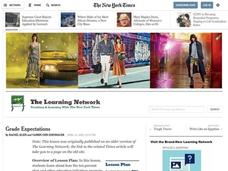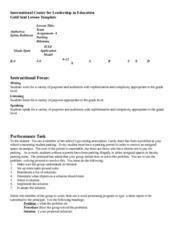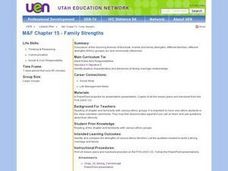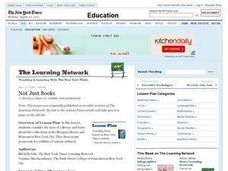Curated OER
Grade Expectations
Students explore how the ten percent plan and other education initiatives promote diversity, as well as about their practical effects on students from different types of educational and economic backgrounds. They discuss college...
National Endowment for the Humanities
“Twelve Years a Slave”: Analyzing Slave Narratives
Readers of Solomon Northup's brutally frank slave narrative Twelve Years a Slave examine passages that support the argument that slavery "undermined and corrupted" the institution of marriage. Background information is provided by a...
Curated OER
Edible Numbers
Believe it or not, this is a 76-page series of lesson plans published by the California Commission on Agriculture which is designed to teach upper-elementary learners about agricultural practices and products in the state. There are two...
Curated OER
Where'd You Get Those Genes?
Really a unit, this resource exposes middle schoolers to genetics at their level. They read interviews and biographies, trace a family tree, play games that simulate inheritance concepts, and more! Teacher's procedures, student...
Curated OER
Team Assignment - A Parking Dilemma
Class groups are challenged to solve the school’s parking problem. Each team must establish ground rules for their discussion, determine criteria that must be met, and brainstorm possible solutions. Next, they agree on one solution and...
Curated OER
Family Strengths
Learners identify positive characteristics and behaviors of strong marriage relationships. They identify and compare the strengths of various ethnic families and list the qualities needed to build a strong marriage and family.
Curated OER
Get To Know Your Local Philanthropic Organizations
Students develop appropriate interview questions, interview a philanthropic organization, and present information to the class. They use pamphlets and/or other materials gained during their interviews to mount a display about the local...
Curated OER
Creating the Pamphlet
Learners create philanthropic brochures. In this philanthropy lesson, students make promotional pamphlets and offer theirs products to philanthropic organizations.
Curated OER
A Grand Showing
Students promote philanthropy. In this service learning lesson, students create video documentaries based on service learning projects they completed and then share the video with their peers and community.
Curated OER
La Presencia Escondida: Spanish Speakers in Our Community
Students effectively operate a digital camera and conduct basic interviews with Spanish speaking people in Spanish. They conduct in-depth interviews with interviewees in English, if possible, and transcribe all or portions of the...
Curated OER
Behavior Code
Students develop codes to guide individual actions and responsibilities as members of the team. They explore memories, journal entries, etc. about
about teamwork. Through prompting questions, they translate these into a
draft behavior...
Curated OER
Not Just Books
Learners consider uses of a library and explore the collections at the Morgan Library and Museum in New York City, and create proposals for exhibits of various artifacts.
Curated OER
Protective Services/ "Dump Busters"
Students tell,write and show the importance of following correct procedures to promote safety of self, others, property, and shared resources. They
determine a crime suspect through systematic inquiry and objective information gathering.
Curated OER
The Real World War II
Pupils work in groups in order to investigate primary and secondary resources in order to make their own conclusions about the history of World War II. They look at the evidence critically looking to find valid resources.















